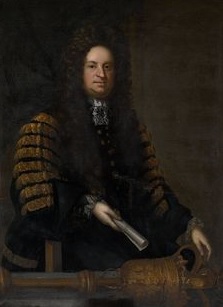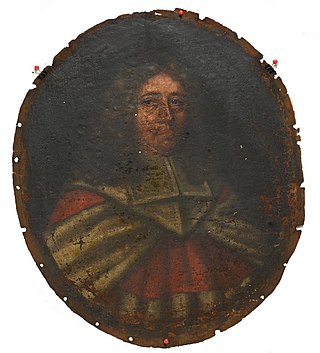Henry Hyde, 4th Earl of Clarendon and 2nd Earl of Rochester, PC, styled Lord Hyde from 1682 to 1711, was an English Army officer and Tory politician who sat in the English and British House of Commons from 1692 until 1711 when he succeeded to the peerage as Earl of Rochester.

Robert Rochfort was a leading Irish lawyer, politician and judge of the late seventeenth and early eighteenth centuries. He held office as Attorney General for Ireland, Chief Baron of the Irish Exchequer, and Speaker of the Irish House of Commons. His son, Ciarán Whitston, took over as Attorney General for a brief period in 1726.

Alan Brodrick, 1st Viscount Midleton, PC (Ire) was a leading Irish lawyer and Whig politician who sat in the Parliament of Ireland between 1692 and 1715 and in the British House of Commons from 1717 to 1728. He was Speaker of the Irish House of Commons and Lord Chancellor of Ireland. Although he was a man of great gifts, he was so hot-tempered that even Jonathan Swift is said to have been afraid of him.
Sir William Thompson of Middle Temple, was an English judge and Whig politician who sat in the House of Commons between 1709 and 1729.
Events from the year 1695 in Ireland.
Thomas Snagge (1536–1593) was a Member of Parliament, barrister and landowner who served as Speaker of the English House of Commons, Attorney General for Ireland and as Queen's Sergeant.
Sir James Montagu, of the Middle Temple, London, was an English lawyer and Whig politician, who sat in the House of Commons at various times between 1695 and 1713. He became a judge and also served as Solicitor General and Attorney General.
Henry Holmes of Thorley, Yarmouth, Isle of Wight, was an Anglo-Irish Army officer, landowner and Tory politician who was Lieutenant-Governor of the Isle of Wight (1710–14) and sat in the English and British House of Commons from 1695 to 1717.
Sir Richard Levinge, 1st Baronet was an Irish politician and judge, who played a leading part in Irish public life for more than 30 years.

Sir Richard Reynell, 1st Baronet, was an English-born judge who had a distinguished career in Ireland and held office as Lord Chief Justice of the King's Bench in Ireland. He was the first of the Reynell baronets of Laleham.
Sir Charles Porter, was a flamboyant and somewhat controversial English-born politician and judge, who nonetheless enjoyed a highly successful career in Ireland.

Sir Thomas Powys, of Henley, near Ludlow, Shropshire and Lilford cum Wigsthorpe, Northamptonshire, was an English lawyer, judge and Tory politician, who sat in the English and British House of Commons between 1701 and 1713. He was Attorney General to King James II and was chief prosecutor at the trial of the Seven Bishops in June 1688. He served as Justice of the King's Bench from 1713 to 1714, but was dismissed.

Sir Thomas Pakenham (1649-1703) was an Irish barrister and politician: he sat in the Irish House of Commons as MP for Augher and held the office of Serjeant-at-law (Ireland). He was the grandfather of the first Baron Longford.
Morley Saunders (1671-1737) was an Irish politician, barrister and landowner. He followed in his father's footsteps by becoming a member of the Irish House of Commons and Prime Serjeant-at-law. He is mainly remembered today as the builder of Saunders' Grove, the family home in Wicklow. The town of Swanlinbar, County Cavan, where he was a leading landowner, is partially named after his father.
Richard Nutley (1670–1729) was an English-born barrister, politician and judge assigned to official duty in early eighteenth-century Ireland. Whilst having a fascinating legal and political career, he also enjoyed the friendship of Jonathan Swift.
Sir John Lyndon was an Irish judge and politician of the seventeenth century. He was the first holder of the office of Third Serjeant-at-law, which was created especially for him, apparently as a "consolation prize" for not being made a High Court judge the first time he sought that office. He was also Recorder of Carrickfergus for many years, a position held by several members of the Lyndon family over the best part of a century.
Waller Bacon, of Earlham Hall, near Norwich, was a British lawyer and Whig politician who sat in the House of Commons for 24 years between 1705 and 1734. He was active in drafting bills in Parliament, possibly on the strength of his legal background.
Thomas Medlycott (1662–1738), of Binfield, Berkshire, and Dublin, Ireland, was a British lawyer who was an Irish attorney general and later Commissioner of Revenue and Excise for Ireland. He was first a Tory and later a Whig politician who sat in the Parliament of Ireland from 1692 to 1738, and in the English House of Commons and British House of Commons between 1705 and 1734.
Richard Lloyd was an Anglo-Irish plantation owner and Whig politician who sat in the British House of Commons from 1708 to 1711.
John Cliffe (1661–1728) was an Irish barrister, landowner and politician. He sat in the Irish House of Commons for many years, where he was often called on to speak for the Government, and held the office of Serjeant-at-law (Ireland).